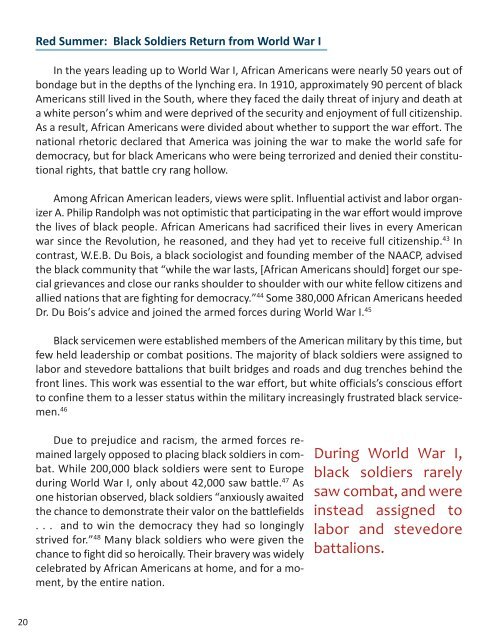Create successful ePaper yourself
Turn your PDF publications into a flip-book with our unique Google optimized e-Paper software.
Red Summer: Black Soldiers Return from World War I<br />
In the years lead<strong>in</strong>g up to World War I, African <strong>America</strong>ns were nearly 50 years out of<br />
bondage but <strong>in</strong> the depths of the lynch<strong>in</strong>g era. In 1910, approximately 90 percent of black<br />
<strong>America</strong>ns still lived <strong>in</strong> the South, where they faced the daily threat of <strong>in</strong>jury and death at<br />
a white person’s whim and were deprived of the security and enjoyment of full citizenship.<br />
As a result, African <strong>America</strong>ns were divided about whether to support the war effort. The<br />
national rhetoric declared that <strong>America</strong> was jo<strong>in</strong><strong>in</strong>g the war to make the world safe for<br />
democracy, but for black <strong>America</strong>ns who were be<strong>in</strong>g terrorized and denied their constitutional<br />
rights, that battle cry rang hollow.<br />
Among African <strong>America</strong>n leaders, views were split. Influential activist and labor organizer<br />
A. Philip Randolph was not optimistic that participat<strong>in</strong>g <strong>in</strong> the war effort would improve<br />
the lives of black people. African <strong>America</strong>ns had sacrificed their lives <strong>in</strong> every <strong>America</strong>n<br />
war s<strong>in</strong>ce the Revolution, he reasoned, and they had yet to receive full citizenship. 43 In<br />
contrast, W.E.B. Du Bois, a black sociologist and found<strong>in</strong>g member of the NAACP, advised<br />
the black community that “while the war lasts, [African <strong>America</strong>ns should] forget our special<br />
grievances and close our ranks shoulder to shoulder with our white fellow citizens and<br />
allied nations that are fight<strong>in</strong>g for democracy.” 44 Some 380,000 African <strong>America</strong>ns heeded<br />
Dr. Du Bois’s advice and jo<strong>in</strong>ed the armed forces dur<strong>in</strong>g World War I. 45<br />
Black servicemen were established members of the <strong>America</strong>n military by this time, but<br />
few held leadership or combat positions. The majority of black soldiers were assigned to<br />
labor and stevedore battalions that built bridges and roads and dug trenches beh<strong>in</strong>d the<br />
front l<strong>in</strong>es. This work was essential to the war effort, but white officials’s conscious effort<br />
to conf<strong>in</strong>e them to a lesser status with<strong>in</strong> the military <strong>in</strong>creas<strong>in</strong>gly frustrated black servicemen.<br />
46<br />
Due to prejudice and racism, the armed forces rema<strong>in</strong>ed<br />
largely opposed to plac<strong>in</strong>g black soldiers <strong>in</strong> combat.<br />
While 200,000 black soldiers were sent to Europe<br />
dur<strong>in</strong>g World War I, only about 42,000 saw battle. 47 As<br />
one historian observed, black soldiers “anxiously awaited<br />
the chance to demonstrate their valor on the battlefields<br />
. . . and to w<strong>in</strong> the democracy they had so long<strong>in</strong>gly<br />
strived for.” 48 Many black soldiers who were given the<br />
chance to fight did so heroically. Their bravery was widely<br />
celebrated by African <strong>America</strong>ns at home, and for a moment,<br />
by the entire nation.<br />
Dur<strong>in</strong>g World War I,<br />
black soldiers rarely<br />
saw combat, and were<br />
<strong>in</strong>stead assigned to<br />
labor and stevedore<br />
battalions.<br />
20


